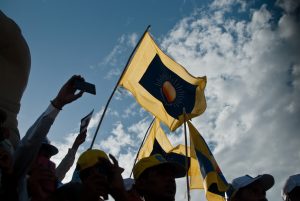A former Cambodian opposition MP was shot dead by a gunman on a motorcycle in Bangkok yesterday in an apparent political assassination, according to Thai media reports.
The Bangkok Post reported that Lim Kimya, 73, was shot twice at around 4 p.m. near Wat Bowonniwet Vihara in the city’s Phra Nakhon district. He then “died at the scene.” It said that “officers with the Metropolitan Police Bureau have launched a manhunt for the assassin.”
As per the Post, police said surveillance camera video from the scene showed “a man riding a red Honda Wave 100 motorcycle, license plate number 845, wearing a helmet, long jeans and a grey short-sleeved shirt with a bag across the front.” According to Radio Free Asia, surveillance video footage posted to Facebook “showed a tall man remove his helmet just before strolling across a busy street.” Three shots can then be heard off camera, before the man jogs back to his motorbike and makes his getaway.
Kimya, a dual Cambodian-French citizen, had recently traveled to Bangkok by bus from Siem Reap in western Cambodia with his French wife and Cambodian uncle, the Post reported.
Kimya was a member of the Cambodia National Rescue Party (CNRP), which was the main opposition party in Cambodia from its formation in 2012 to its dissolution by the Supreme Court in late 2017. He was elected to parliament for the CNRP in Kampong Thom province during the national election in July 2013, when the party came close to dislodging the ruling Cambodian People’s Party (CPP). After another strong showing at the commune election of June 2017, the CNRP was dissolved by the Supreme Court in November of that year on the grounds that it was plotting to overthrow the government. The party’s President Kem Sokha was arrested and most of its senior leadership fled into exile abroad.
Kimya was reportedly among the handful of former party MPs who remained behind in Cambodia, and took part in protests outside the remote prison where Kem Sokha was held following his arrest. In an interview with the AFP news agency in November 2017, he pledged that he would “never give up politics.”
In a statement, the exiled CNRP said that it was “deeply shocked and appalled” by Kimya’s killing. “This cold-blooded murder, carried out in broad daylight, demonstrates a chilling disregard for human life and the rule of law,” it said. It urged the Thai authorities “to conduct a swift, thorough, and impartial investigation into this murder and bring the perpetrators to justice.”
Kimya’s apparent assassination is a stark sign of how inhospitable Southeast Asia has become for dissidents, as the region’s governments collude more closely to prevent government critics or opponents from using neighboring countries as safe havens.
In a report published last May, Human Rights Watch described this reciprocal arrangement as a “swap mart” of refugees and dissidents. The report noted that a growing number of exiles “have faced surveillance, violence, abductions, enforced disappearances, and forced returns facilitated by the government of Thailand.” At the same time, “Thai authorities have engaged in acts of transnational repression against exiled Thai activists in Southeast Asia.”
A recent Washington Post article on the phenomenon quoted Volker Türk, the U.N. High Commissioner for Human Rights, who said in June that a “pattern is emerging” of transnational repression in Southeast Asia, in which “human rights defenders seeking refuge in neighboring countries have been subject to rendition and refoulement or disappeared and even killed.”
This trend of transnational repression has largely ended Thailand’s status as a sanctuary for Cambodian dissidents fleeing CPP repression. The Thai government, which could once be expected to turn a blind eye to the presence of Cambodian nationals, has become more active in arresting and sending them back across the border.
In recent years, it has arrested and deported dozens of Cambodian dissident refugees, some of whom have faced arrest and mistreatment on their arrival home. Last June, the Thai authorities arrested an indigenous Montagnard activist from Vietnam, whom a court in October ruled should be extradited to Vietnam, where he faces up to a decade in prison on terrorism charges. Phil Robertson, director of the advocacy group Asia Human Rights and Labour Advocates (AHRLA), said in an emailed statement that Kimya’s apparent “political assassination” appeared to mark “a significant escalation in the use of transnational repression in Bangkok.”
This new “understanding” also extends beyond those involved in politics or human rights advocacy. Last year, the Cambodian authorities expended considerable diplomatic resources on securing the deportation from Malaysia of a 36-year-old woman by the name of Nuon Toeun, who was working as a maid for a family in Kuala Lumpur. Her crime? Criticizing the Cambodian government and its Prime Minister Hun Manet on social media. According to the Washington Post, which used Toeun’s case to illustrate the brazen and repressive nature of the new status quo in Southeast Asia, she “has been detained without bail since then outside Phnom Penh, the capital.” She will soon face trial for “incitement.”
The brazen nature of Kimya’s killing itself is telling; it hints at an awareness that such acts can be ordered and committed with a fair confidence that those responsible stand little chance of being apprehended, let alone successfully prosecuted.

































